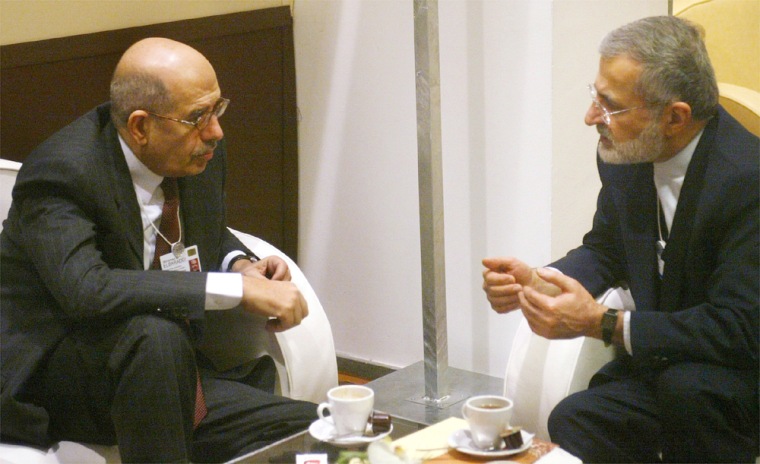The head of the International Atomic Energy Agency (IAEA) pressed Iran on Saturday to suspend more activities related to enriching uranium, a technology that can be used to make nuclear weapons.
“I am advising them that it would be good to have a very generous, comprehensive suspension,” Mohamed Elbaradei told Reuters after talks with Iranian Foreign Minister Kamal Kharrazi at the World Economic Forum in Davos, Switzerland.
“That would create confidence and it would help me and the Europeans to move forward in normalizing and expanding cooperation between Iran and the international community.”
He said IAEA concerns focused on the discovery by agency inspectors in Iran of equipment contaminated with highly enriched uranium, along with continued enrichment-related activities like production of centrifuges.
Iran has blamed the contamination on parts imported from elsewhere without identifying their origin.
Asked about the IAEA’s concerns, Kharrazi said: “It’s just a question of spare parts or something, it’s minor issues.”
“We have very good cooperation with the IAEA,” he told Reuters. “I believe the important thing is that we do not have any program to produce weapons and this is now established.”
Washington backs European diplomacy
U.S. Vice President Dick Cheney, also in Davos, said his country would support European diplomatic efforts to get the Iranians to agree to a more intrusive inspection regime.
“We’ll have to see whether or not that produces the desired result. We believe the Iranians have been actively and aggressively pursuing an effort to develop nuclear weapons,” Cheney told the conference of political and business leaders.
“They deny that, but there seems to be a good deal of evidence out there to support the fact that that’s exactly what they have been doing,” he said.
Kharrazi said Iran’s nuclear technology was a source of pride for all Iranians. “At the same time it is totally peaceful and nothing is wrong with having nuclear technology for peaceful purposes,” he said.
“We have suspended the activities of uranium enrichment, but this does not mean we are going to stop it for ever. This is our right, based on the NPT, to have nuclear activities for peaceful purposes,” he said, referring to the provisions in the Nuclear Non-Proliferation Treaty for the sharing of nuclear know-how.
France, Britain and Germany, whose diplomacy encouraged Iran to suspend uranium enrichment and sign the NPT’s additional protocol permitting intrusive inspections, worry that Iran is reneging on its November pledge to halt all enrichment-related activities in return for a possible exchange of technology.
Western diplomats say Tehran has been acquiring large amounts of equipment for centrifuges, used to enrich uranium.
On Monday, the foreign ministers of France, Germany and Britain met and discussed Iran’s insistence on applying a very limited definition of the term “enrichment-related” to enable Tehran to continue amassing centrifuges.
